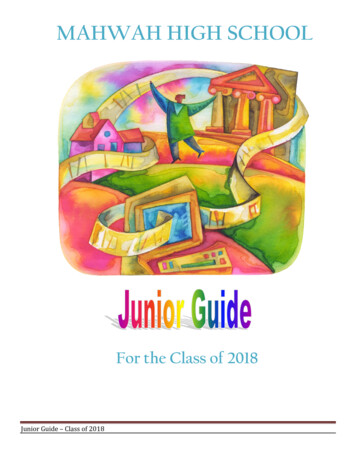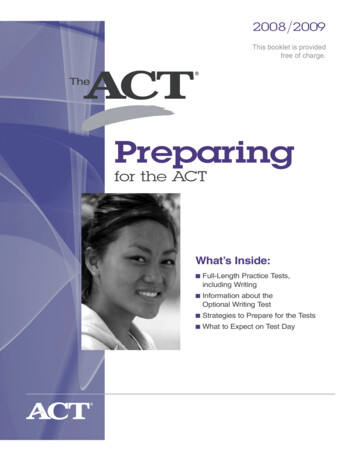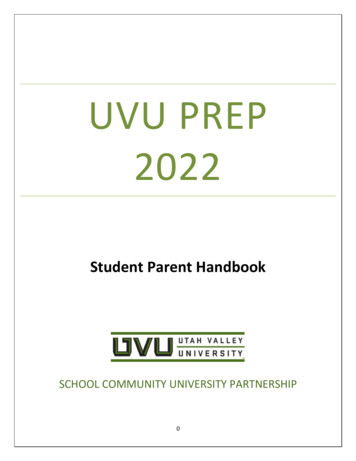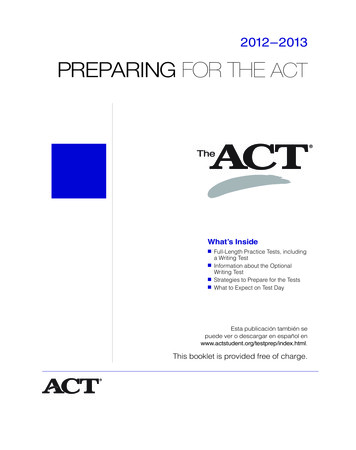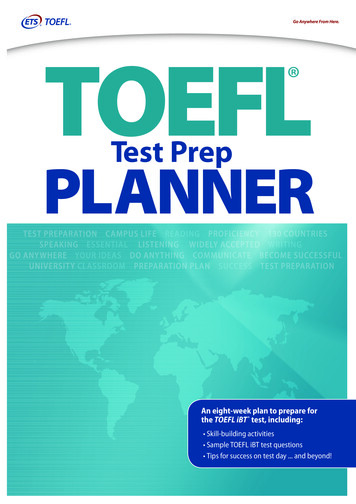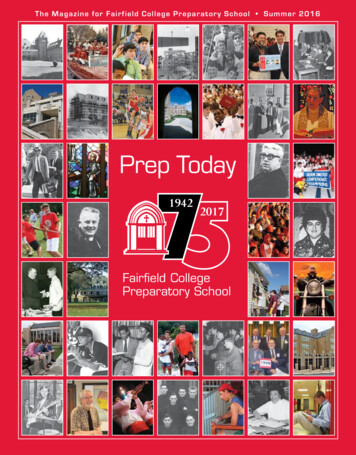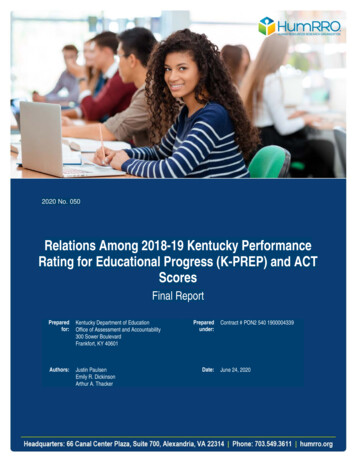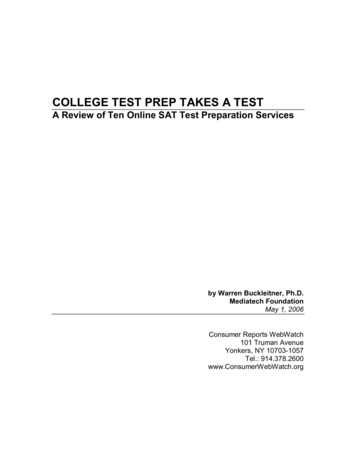
Transcription
COLLEGE TEST PREP TAKES A TESTA Review of Ten Online SAT Test Preparation Servicesby Warren Buckleitner, Ph.D.Mediatech FoundationMay 1, 2006Consumer Reports WebWatch101 Truman AvenueYonkers, NY 10703 1057Tel.: 914.378.2600www.ConsumerWebWatch.org
TABLE OF CONTENTSEXECUTIVE SUMMARY 3KEY FINDINGS 5CREDITS 6ABOUT CONSUMER REPORTS WEBWATCH 7INTRODUCTION AND METHODOLOGY 8A New Way to Prep: Online 8METHODOLOGY 9Selection of Online Test Prep Services 9Selection of Student Testers 10The Testing Process 11Data Collection 11MAJOR FINDINGS AND CONCERNS 13Online Services Come with Aggressive Advertising 13Higher Price and Reputation Don’t Necessarily Make for Better Products 14Students’ Privacy Protection Questioned 14Site Functionality Influences Perception of Trust 15Interactivity Distinguishes Online Services, Needs Improvement 15Errors Abound 16Site Identity Often Confusing 16Technical Glitches Hamper Site Performance 16Customer Service Generally Good 17RESULTS BY SERVICE 18Barron's Test Prep 18Boston Test Prep 18Kaplan's SAT Online Prep 19Number2.com 21Peterson's Online SAT Course 23PrepMe 23SAT Secrets 25Test Preparation Program Online Test Prep 25The Official SAT Online Course 26The Princeton Review 26TIPS FOR STUDENTS AND FAMILIES 29RECOMMENDATIONS FOR PUBLISHERS 31Appendix 1: Online SAT Test Preparation Evaluation Instrument 32Appendix II: Student Responses 38Appendix III: Academic Profile of Student Testers 41Appendix IV: Student Tester SAT Scores, Before and After Study, by Service 43Page 2
EXECUTIVE SUMMARYTaking the SAT exam has become a rite of passage for more than 1 millioncollege bound American high school students each year, a number that hassteadily increased since the SAT was first administered by the nonprofit CollegeBoard in 1926.Not surprisingly, demand for SAT test preparation services has grown in tandem,fueled by the competitive nature of college admissions and the ability to take theSAT repeatedly to try for a better score. There are also more students withcollege plans, according to statistics provided by The College Board. The numberof college students rose 15 percent in the decade ending in 2003, while thenumber of students taking the SAT grew 35 percent, to almost 1.5 million thisyear – the 15th consecutive year of growth. 1Additionally, Americans’ appetite for test preparation assistance grew noticeablythis year, when the “new” SAT format was unveiled. For the first time, the testfeatured an open ended, essay writing component in addition to the traditionalmultiple choice test format. The scoring system also was revised, with a newhigh score of 2400 rather than the traditional 1600.As a result of this confluence of factors, the market for test preparation servicesin general, not just for the SAT, has ballooned to more than 4 billion, accordingto Eduventures Inc., a Boston based market research firm. A student facing aforthcoming SAT exam can purchase a variety of products that promise a betterscore, including Web based programs, books, flash cards, hand held electronicdevices, software, personal tutors and classes. There are also a variety of free orlow cost options, such high school courses, and free resources provided at thesite of the test maker, The College Board and others. Internet delivered testpreparation products are among the newest form of test prep to emerge in recentyears, representing a growing slice of the market estimated at 50 million,according to Eduventures.Due to the expanding test preparation services market and the increasing rolethe Internet is playing in delivering these services to students and families,Consumer Reports WebWatch spent five weeks in the summer of 2005examining 10 Web sites providing online SAT test prep services. WebWatchwanted to learn how the market’s largest, best known and, often, most expensiveoptions – such as services from Kaplan and The Princeton Review – faredagainst smaller, lesser known services, such as the free site Number2.com. Thefield of 10 sites, therefore, was selected with a focus on cost variation and marketshare, to assure a mix of sites was included. This report reviewed only those1The College Board. Available online 51,00.htmlPage 3
services offered online, not those featuring live tutors, books, classes or otheroffline study aids.The 10 services evaluated were: Barron’s Test Prep, Boston Test Prep, Kaplan'sSAT Online Prep, Number2.com, Peterson's SAT Online Course, PrepMe, SATSecrets, Test Preparation Program, The Official SAT Online Course, and ThePrinceton Review.The evaluation process consisted of both expert and student testing. WebWatch,in conjunction with Mediatech Foundation, recruited 20 high school juniors whohad already taken the SAT test in the spring of 2005 and planned to take theexam again in the fall. Each of the 10 sites was reviewed by two students duringa minimum of five, four hour sessions in a controlled lab setting under thesupervision of the study authors, both experienced educators. Testers spentmore than 400 combined hours reviewing these sites,While testers deemed seven of the 10 sites generally effective in their productdelivery and the overall quality of their services, WebWatch noted some troublingtrends, particularly regarding the blending of advertising and educational contentand aggressive marketing of promotional materials to college bound students. Inone case, a student who expressed interest in free scholarship informationreceived an e mail containing a link to an Air Force Reserve Officer TrainingCorps enrollment form. Students using these services are most often legalminors, and greater care should be taken to not pressure them, either directly orindirectly, to share their personal information or to prompt them to purchaseadditional products with the promise of a higher score.Moreover, marketing practices of some sites can be considered questionable,such as the implied promise of access to Ivy League educators, or combiningtest reminders with add on products. Peterson's SAT Online Course, forexample, promised access to a Harvard educated essay reader whose identitywas never revealed, and whose credentials, therefore, could not be verified.Some testers were surprised to learn The Princeton Review had no actualconnection to Princeton University or the Educational Testing Service, which islocated in Princeton, N.J. More troubling was the practice of using test anxiety asa motivator to purchase more books or products by combining e mail testpreparation reminders with product advertisements.In addition, testers found typos and grammatical errors on some sites, promptingconcern about the inconsistent quality of purchased online materials. Thesediscoveries not only chipped away at the perceived credibility of online productsdesigned to help students excel on a scholastic aptitude test, but also promptedquestions regarding the credentials of those providing – and charging for – theseservices.Page 4
Overall, however, the testers appear to have benefited from the process ofspending hours on these test preparation sites. The 20 high school juniors whoserved as testers took the SAT for the second time in the fall of 2005, afterparticipating in this study, and saw their test scores improve by an average of 38points per student – a 1.6% gain. While this scoring increase may be the result ofmany factors, including greater familiarity with the SAT test, the students didappear to gain greater testing confidence after dedicating hours to testpreparation.KEY FINDINGSOnline Services Come with Aggressive Advertising. By registeringfor services, including Kaplan's, The College Board, Boston Test Prepand The Princeton Review, students were suffused with messagesfrom college and military recruiters or offers for financial aid or studyaids. One e mail message from The Princeton Review contained a linkto a United States Air Force recruiting form. Additionally, The CollegeBoard marketed its Web based online test prep service in advertisingspace not clearly distinguished from free test resources.Errors Abound. Mistakes in online sample tests – includinggrammatical problems, questions with no answers, missing sections oftext, font problems, or poorly constructed questions – were consistentlypresent in 6 of the 10 services evaluated, but were particularly evidentin Barron's Test Prep, Peterson's SAT Online Course, PrepMe andTest Preparation Program sites. Only one of the 10 services tested —Boston Test Prep — offered a means for reporting errors.Higher Price and Reputation Don’t Necessarily Make for BetterProducts. Number2.com was the only free of charge service tested,and it performed exceptionally well against expensive, better knownproducts, such as The Princeton Review and Kaplan's. The prepservice offered by The College Board, the creator of the SAT, wasbuggy and lacked interactive features common on other sites. Testersalso found The College Board’s computerized essay grading servicetoo general to be useful, compared with The Princeton Review’s morespecific feedback provided by human editors.Technical Issues Hampered Performance. Kaplan's SAT OnlinePrep, The Princeton Review and Boston Test Prep may not work onolder browsers with virus protection or pop up blocking featuresactivated, testers discovered. New versions of browsers arerecommended or required, with current plugins and the ability to usecookies turned on. Unfortunately, this also makes a browser morevulnerable to pop up advertising and adware.Page 5
Students’ Privacy Protection Questioned. Some sites containedonly vague descriptions about what student information would beshared, and with whom. The Princeton Review, The College Board,and Kaplan's SAT Online Prep were not forthcoming about who their“partners” were and what “opt in” actually means, definitions thatshould be clearly provided and easy to understand, given the targetaudience for these products is teenagers.CREDITSThis project was written and directed by Warren Buckleitner, Ph.D., a consultantand adviser to Consumer Reports WebWatch. Buckleitner is editor of Children'sTechnology Review, a periodical covering children’s interactive media. He also isthe founder and interim director of the Mediatech Foundation, a non profit publiccommunity technology center based in Flemington, N.J., where the research wasconducted. This study was coordinated by Linda Bradway, a retired public schoolprincipal and researcher at Mediatech.The project was funded at a cost of approximately 33,000 by Consumer ReportsWebWatch, with funding and staff contribution from Consumers Union’s Statistics& Quality Management Department. The research report was edited by TracyZiemer, WebWatch’s researcher and Web site producer at the time of the testing,and Beau Brendler, WebWatch’s director. Consumers Union and Mediatech arenot affiliated with any SAT test prep service reviewed in this study.Page 6
ABOUT CONSUMER REPORTS WEBWATCHConsumer Reports WebWatch is a project of Consumers Union, the non profitpublisher of Consumer Reports magazine and ConsumerReports.org. NoConsumers Union publication accepts any funds whatsoever from advertising.WebWatch is supported by The Pew Charitable Trusts, which invests in ideasthat fuel timely action and result; the John S. and James L. Knight Foundation,which promotes excellence in journalism worldwide and invests in the vitality of26 U.S. communities; and the Open Society Institute, which encourages debatein areas in which one view of an issue dominates all others.Consumer Reports WebWatch's mission is to improve the credibility of Websites, through research, news investigations, and articulation of best practicesguidelines in specific sectors of Web publishing. WebWatch's research,investigations, guidelines, conference transcripts, a list of sites that comply withWebWatch's best practices guidelines, and other materials are available for freeat http://www.consumerwebwatch.org.Page 7
INTRODUCTION AND METHODOLOGYWhat costs 41.50, lasts almost four hours, and gets almost 1.5 millionteenagers – actually, 1,475,623 in 2005 out of bed early on a Saturdaymorning? The answer is the SAT, an often mind numbing rite of passage foralmost every U.S. student who wants to attend college.The SAT Reasoning Test was commissioned in 1926 by an association ofcolleges, known today as The College Board, with the intention of measuring astudent’s critical reading, math and writing skills needed for academic success incollege. In 1947, The College Board began working with the Educational TestingService (ETS), a large, independent, non profit organization in Princeton, N.J., tocreate and administer the SAT. Today, ETS is a thriving hub of standardizedtesting, creator of more than 30 well known tests that include the GRE, AP andTOEFL. The College Board remains ETS’s largest client. While groups such asthe National Center for Fair & Open Testing debate the value of standardizedtesting, there is no denying the SAT is entrenched in American academic culture.The SAT, given seven times per year across the country, is designed tochallenge even the brightest student, especially those who have not come face to face with a quadratic equation for some time. The test is almost entirelymultiple choice, though the format of the SAT changed rather significantly in2005 to include an open ended essay writing section. In addition, there are nowthree sections instead of two and a more difficult math section. Students canachieve a top score of 2400 instead of 1600.A common strategy for many students, including the 20 that participated in thisstudy, is to take the test at least twice once during their junior year, typically thespring, then again the first semester of their senior year to try for a better score.Students can take the SAT as many times as they are willing to pay for it,tormenting some students with the notion that, as with a golf swing, one canalways do better.A New Way to Prep: OnlineThe increasingly competitive nature of college admissions, combined with theability to take the test more than once, has created a thriving SAT test prepbusiness. In the past, test prep products have consisted of books, personal tutorsand classes. More recently, subscription based online test prep courses havebecome available. Requiring a computer, credit card and Internet connection,these services differ considerably in price and service.While the exact size of the online SAT market is difficult to define, it has beenestimated at 50 million by Eduventures Inc., a Boston based education marketresearch firm. One of the market leaders, The Princeton Review, provides prepPage 8
services for a variety of tests, including the SAT, and reported a 15% increase intest prep revenue, from 61.2 million in 2004 to 70.3 million in 2005.It’s significant to recognize the lure of 1.5 million SAT takers and future U.S.college students as a market demographic group to commercial and, potentially,military interests. This is a population on the verge of spending tens of thousandsdollars on college tuition, housing, books, computers and other electronics.Moreover, some families are making long term decisions about loans, mobilephone services, scholarships and first time credit card ownership.Given the potential financial significance of this demographic, WebWatch alsoexamined relationships between these business interests and test preparationsites and discovered troubling issues regarding the handling of students’ privateinformation and advertising to minors. This matter is discussed at greater lengthin the Findings and Concerns section of this report.METHODOLOGYSelection of Online Test Prep ServicesIn an effort to better understand the nature of the online test preparationbusiness, WebWatch surveyed both commercial, for profit services and non profit options, and selected 10 sites that represented a mix of prices and marketshare to assure the full spectrum of options available to students was covered.The sites selected included both household name programs, such as TheCollege Board, Kaplan's and Princeton Review, as well as lesser knownservices, such as PrepMe and SAT Secrets.In order to be considered, a site had to meet the following criteria: Actively advertise test prep services for the new SAT format on their Internetsites; Be available during a time period of July 15 Aug 15, 2005, when WebWatchconducted testing; Be delivered primarily via the Internet rather than through books, classes orpersonal tutors.The following services were selected for this study, listed here with thesubscription prices paid by WebWatch on or around July 15, 2005:1. Barron's Test Prep from Barron's Educational Series, Inc., 10.95 for 6months; www.barronstestprep.com.2. Boston Test Prep from Boston Test Prep, 99.00 for 3 months;http://sat.bostontestprep.com.3. Kaplan's SAT Online Prep from Kaplan, Inc., 399.00 for 6 months;www.kaptest.com.Page 9
4. Number2.com from Xap Corp., free, with no time limit; www.number2.com.5. Peterson's SAT Online Course from The Thompson Corporation, 169.95for 4 months; www.petersons.com.6. PrepMe from PrepMe Corporation, 499.99 for 4 months;www.prepme.com.7. SAT Secrets from Morrison Media LLC, 49.95;www.secretsstudyguide.com/sat/8. Test Preparation Program from Online Test Prep, 29.95 for 3 months;www.onlinetestprep.com.9. The Official SAT Online Course from The College Board, 69.95 for 4months; http://store.collegeboard.com.10. The Princeton Review SAT Online from the Princeton Review, 399.00 for4 months; www.review.comSelection of Student TestersThese 10 online SAT test preparation services were evaluated by 20 high schooljuniors in New Jersey, where Mediatech, a non profit community technologycenter, is located. The students, recruited through a local newspaper article,received free access to two randomly selected services in exchange for their siteevaluations and future SAT test scores. The test prep sessions took place everyweekday morning from 9am to noon on Internet enabled computer stationsoverthe course of four weeks.This field of 20 students (11 male, 9 female):····Was willing to share past and future SAT scores, and high school gradepoint averages;Was from four different New Jersey high schools (three public, oneprivate);Had already taken the SAT test, with the new essay format, in the springof 2005 and planned to take it again in the fall;Was doing no other test preparation over the summer in addition to thework at Mediatech for this study.It should be noted 20 testers is not large a large enough sample to claimstatistical significance with any of the measures. No statistical validity should beassumed by the reader with regard to the quantitative measures in this report.Instead, the student responses provide qualitative indicators of how a smallgroup of randomly assigned student testers felt about a particular service duringa specific time period.Page 10
The Testing ProcessStudents were randomly assigned a test prep service to evaluate, then wereregistered to that service using real names and home mailing addresses. Theywere also given an operational e mail address created specifically for this project.This e mail address was continually monitored by one of the adult researchers totrack ongoing correspondence from the sites, such as promotional offers,reminders or billing issues.While students were encouraged to stay with their assigned programs, four of the20 students requested permission to change to another service after alertingadult researchers as to significant site performance and/or content issues withtheir assigned sites. Researchers made note of the issues at hand and, if agreedthe student’s test preparation needs were not being met, granted permission forstudents to evaluate another service.Eight of the 10 services were evaluated by two or more students for a minimumof 10, four hour sessions for a total of 40 hours per service. The two exceptionswere PrepMe and SAT Secrets; in these cases, students requested permissionto terminate participation in these services. (For more information, see Results byService). In all, students logged more than 400 hours at Mediatech evaluatingservices, with additional hours logged at home.Students were instructed to deny permission to share personal information withoutside partners, or opt out of this process, when registering. This occurred for allbut two services: Kaplan’s and The Princeton Review. In the case with Kaplan’s,a student accidentally opted in after becoming confused by a registration form.With The Princeton Review registrations, a student who needed to havematerials mailed to a home address was required to opt in, in order to receive thebooklets. In both cases, students could later adjust their personal preferences toopt out of the information exchange.All registration fees were paid by WebWatch, and each student was given a 5cash incentive at the end of each test preparation session.Data CollectionBoth quantitative and qualitative data were collected. Students took screencaptures of each site during the registration process, then used a personal log todocument any site errors, events or comments during the testing process. At theend of the 20 hour period, researchers used a checklist designed to capturestrengths and weaknesses about each test preparation service to interview eachstudent. These checklists were tallied and scored, providing more specificinformation about each service’s strengths and weaknesses (see Appendix 1).Page 11
In addition, sections 6 11 of the instrument were designed specifically to examinefactors that have been associated with the trustworthiness of an Internet service.These include such issues as identity, disclosure, payment and orderconfirmation, privacy and the use of advertising.Page 12
MAJOR FINDINGS AND CONCERNSThe online test preparation services evaluated in this study varied significantly inprice, features and quality. While, in most cases, student testers were pleasedwith their online test prep experience and would recommend this course of studyto others, the research also cast light on serious issues of aggressive advertisingand site performance users of such online services should be aware of.Before detailing these and other observations, the limitations of this researchshould be noted. First, Internet delivered services, including the 10 SAT test prepservices considered in this study, are objects in motion. The observations anddetails described here occurred between July 21 and August 15, 2005.Second, the group of 20 testers was not large enough to provide valid statisticalevidence. Instead, this survey information provides qualitative indicators of how asmall group of randomly selected student testers felt about a particular service.Third, when it comes to the issue of SAT test performance, there are manypotentially confounding variables that can emerge, and sometimes did. Thesecan include test anxiety, exposure to outside test prep materials that may nothave been disclosed, and learning disabilities, to name a few.Despite these statistical limitations, this research provides a thorough qualitativeassessment of online test prep site services and functionality, when the targetaudience is young adults under age 18 making major decisions about theirfutures.Researchers interviewed each student to capture detailed individual reactions toeach test prep site reviewed. Researchers used testers’ perceptions, as well asculled observations during the testing process, to assess a site’s trustworthinessand to arrive at the following findings:Online Services Come with Aggressive AdvertisingBy registering for services, including Kaplan's, The College Board, Boston TestPrep and The Princeton Review, students often received messages from banks,college and military recruiters, or offers for financial aid or study aids. One e mailmessage from The Princeton Review contained a link to a United States AirForce recruiting form.Additionally, The College Board, the maker of the SAT, mixed free “official” testinformation, such as sample tests and parental guidance, with advertisements for"The Official SAT Online Course," a 69.95 product, without disclosing the priceupfront.Page 13
If students were careful to opt out of promotions when registering, nearly all e mail solicitations were avoided. However, this process was not always obvious.In some cases, such as with The Princeton Review and Kaplan’s, opting out wasnot a forthright process. In the case of Boston Test Prep, promotional offersarrived via e mail despite students’ requests not to receive such offers.Higher Price and Reputation Don’t Necessarily Make Better ProductsNumber2.com was the only completely free service tested, and it performedexceptionally well against expensive, better known products, such as ThePrinceton Review and Kaplan's, which cost 399 each.The College Board, the creator of the SAT, was a better known brand thanNumber2.com, but was buggy during testing and lacked interactive featurescommon on other sites. Testers also found The College Board’s computerizedessay grading service to be too general to be useful, compared with ThePrinceton Review’s more specific human feedback.Students’ Privacy Protection QuestionedSome sites contained only vague descriptions about what student informationwould be shared, and with whom. Student testers expressed difficulty findinginformation on business and marketing partnerships and what “opt in” actuallymeans when using online products for The Princeton Review, The CollegeBoard, and Kaplan's SAT Online Prep. These definitions should be clearlyprovided and easy to understand, considering the target audience is teenagers.In all but one case – SAT Secrets – the process for storing or handling studentinformation, including credit card information, was not clearly defined, nor for astudent's personal mailing address, phone, e mail, passwords and personalinterests.In fact, with most sites evaluated, understanding who has access to students’personal information is vague at best. Take, for example, this text from ThePrinceton Review site:"From time to time, we obtain lists of people who may be interested in ourproducts and services from third party marketing list suppliers. We usethese lists to send direct marketing promotions by mail or by email. Wedo our best to only obtain these lists from suppliers who have opt inpolicies for third party marketing, but we are not responsible for theconduct and policies of these suppliers. Please note that even if you area registered customer of ours and have asked us not to use theinformation you provided to us to send you promotional material, a third party marketing list supplier could still provide us with your name andPage 14
address, in which case you will receive the promotional material sent byus to others on the supplier's list. If you have received a promotion fromus and do not wish to receive future promotions, please contact us .com/footer/privacy policy.asp)Given the price of the services being sold – some approaching 500 – and theconfidential nature of student information being collected, it is clear online test prep services need to do a better job disclosing who is behind the service, whatinformation is collected, and how student information is used.Site Functionality Influences Perception of TrustThe overall design and functionality of a site contributed not only to higherstudent satisfaction, but a higher level of trust in that service, testers said. Whenasked to react to design related site elements, such as ease of use, interactivefeatures and technical robustness (see Appendix 1), students gave high marks toKaplan's, Number2.com, Boston Test Prep, Petersons and The PrincetonReview. Of these, Kaplan’s and The Princeton Review were singled out bytesters for providing the best combination of content, coaching methods andindividualized record keeping. The College Board’s Official SAT Online Coursewas deemed trustworthy despite havin
The 10 services evaluated were: Barron's Test Prep, Boston Test Prep, Kaplan's SAT Online Prep, Number2.com, Peterson's SAT Online Course, PrepMe, SAT Secrets, Test Preparation Program, The Official SAT Online Course, and The Princeton Review.
